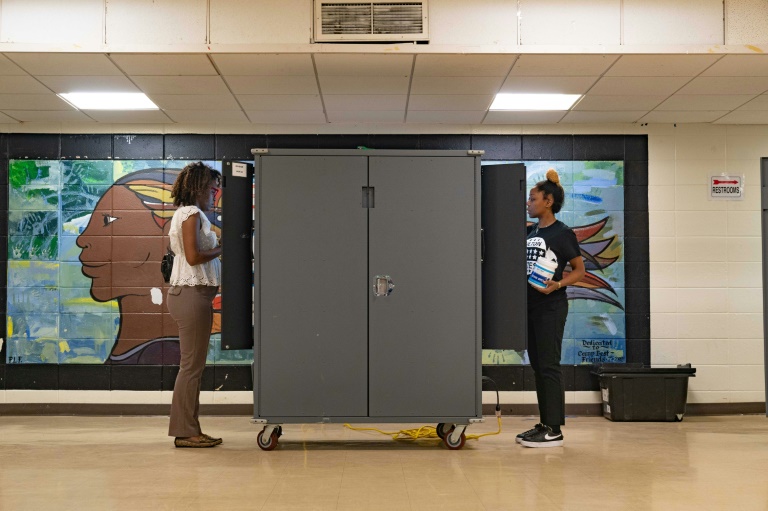UK Voter turnout: Evidence of a class divide?

Voters visit polling places to cast their ballots in the 2022 Primary Election on May 24, 2022 in Atlanta, Georgia – Copyright AFP/File Martin BUREAU
Turnout disparity in UK elections between graduates and non-graduates has widened to 11 percentage points. In 2024 this was twice as high as 2019. As well as the education premium, the gap between homeowners and renters rose to 21 points, signalling a probable divide by social class.
A new election law is needed to tackle rising voting inequalities and low turnout, or risk fuelling distrust and populism, according to the left-of-centre think tank Institute for Public Policy Research (IPPR). It is proposed this could include measures like automatic voter registration and a new civic duty to help at polling stations, akin to jury service. The measures fall short of a demand for compulsory voting (such as with the Australian model).
These findings are based on a detailed analysis of voter turnout in the four general elections since 2015. While voting inequalities across age and income have broadly remained the same, IPPR finds that the turnout gap between those who own their home and those who rent grew by nearly a quarter, to 19 percentage points, between the general elections of 2017 and 2024.
The think tank highlights a critical “blind spot” in the government’s current approach to combating populism (such as the rise of the right-wing Reform UK party). Unless ministers actively work to make democracy more inclusive, such populist movements will continue to gain traction, even if the economy is doing well.
Findings released by IPPR earlier this year revealed that only one in every two adults in the UK voted in this year’s general election – the lowest share of the population to vote in a general election since universal suffrage.
Ideas to remove barriers to voting include:
• Linking up with DVLA, DWP, Passport Office to prompt voter registration, or using National Insurance Numbers to register people automatically when they turn 16.
• Moving polling day to a weekend, as in Australia and New Zealand, or make election day a new public holiday.
• Allowing a wider range of photo IDs, or scrapping ID requirements altogether.
• Including the 5 million long-term tax-paying residents who are not citizens of the UK, Ireland, or Commonwealth nations.
• Basing constituency boundaries on the entire adult population of an area, not just registered voters.
• Lowering the voting age to 16.
• Making citizenship education compulsory in schools.
• Recruiting election-day poll workers from the population by lot, similarly, to recruiting for jury service.
Dr Parth Patel, IPPR associate director of democracy and politics, states: “We are close to the tipping point at which elections begin to lose legitimacy because the majority do not take part. That should be ringing more alarm bells than it is. We all know that elections aren’t perfect, but they are the only opportunity we get to express a desired future for ourselves and our country as a whole.”
Patel adds: “So many people today feel alienated from organised politics. The government may overlook non-voters, but populists don’t. Government can and should look to bring people back into democracy. Capping big money donations, automatically registering voters and creating a new civic duty to staff polling stations will help get voters back.”
To combat this ‘democratic deficit’ the IPPR is urging the introduction of an Elections Bill to address growing voting inequalities and revitalise democratic participation. Among its key proposals is a cap on individual and corporate donations to political parties at £100,000 per year.
In 2023, there were more donations over £1 million than ever before. Before 2017, such donations never totalled £10 million to a single party in a year — but since then, that mark has been passed four times. In 2023, £1 million-plus donations to the two main UK parties totalled close to £50 million, of which almost £39 million was given to the Conservatives, and just over £11 million to the Labour Party.
There are further calls for the rules to be significantly tightened around shell companies and ‘unincorporated associations’, which it says can easily be used to channel illegitimate or foreign funding into UK politics. It calls for ‘due diligence checks’ to establish the true origin of any funds channelled to political parties this way.
UK Voter turnout: Evidence of a class divide?
#Voter #turnout #Evidence #class #divide





